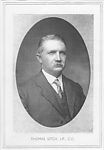 Thomas Sitch
Thomas Sitch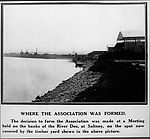 Coal Wharf, Saltney
Coal Wharf, Saltney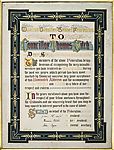 Illuminated Address presented to Thomas Sitch by the Midland Counties Trades Federation
Illuminated Address presented to Thomas Sitch by the Midland Counties Trades Federation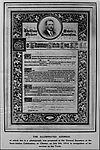 Illuminated Address presented to Thomas Sitch by the Chainmakers' and Strikers' Association
Illuminated Address presented to Thomas Sitch by the Chainmakers' and Strikers' Association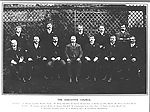 The Executive Council- Thomas Sitch is seated centre
The Executive Council- Thomas Sitch is seated centre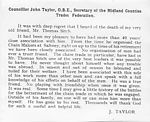 Tribute - Midland Counties Trades Federation
Tribute - Midland Counties Trades Federation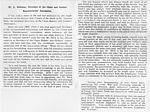 Tribute - Chain and Anchor Manufacturers' Association
Tribute - Chain and Anchor Manufacturers' Association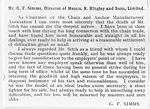 Tribute - N. Hingley and Sons Ltd
Tribute - N. Hingley and Sons Ltd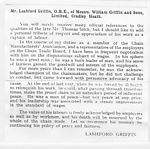 Tribute - Messrs. William Griffin and Sons Ltd
Tribute - Messrs. William Griffin and Sons Ltd

Thomas Sitch was a champion of the Women Chainmakers of Cradley Heath. He was the Secretary of the Chainmakers' and Strikers' Association. He saw to it that the C.M.S.A. played a leading part in getting women's chainmaking covered by the Trade Boards Act, which set a minimum wage. He also supported the women's actions, when they went on strike in 1910, because some employers refused to pay the rate. Thomas was one of five Trustees of the Cradley Heath Workers' Institute, which was built using the money left over from the strike fund.
Thomas was born in Lomeytown, Cradley Heath in 1852. He started work at the age of eight, operating the bellows in a chain shop. He moved with his family, first to Tipton, then Newcastle - on -Tyne, Chester and finally back to Cradley Heath. During that time he had qualified as a chainmaker, and had become very involved in the Trade Union Movement. He was the founder of the Chainmakers' and Strikers' Association, and served as its General Secretary for over thirty years. He had married Miss E. Young in Newcastle in 1877. The couple went on to have 9 children. Charles succeeded his father as Secretary of the C.M.S.A.
In the Semi-Jubilee Souvenir booklet, celebrating 25 years of the C.M.S.A., it is said of Thomas, ''From the day when Mr.Sitch set foot in Cradley Heath 20 years ago astonishing progress has been made in the chain trade. The operatives have reaped many great advantages. Their conditions of employment have been vastly improved.... and greatest of all, their rate of wages is now out of all proportion to what it was." (pp.8-9)
Thomas was also highly regarded by employers. He was always prepared to recognise that there were two sides to every dispute. As a result, his relationship with employers was extremely good, and the industry was virtually strike free. The tributes paid to him, following his death in 1923, demonstrate that he was seen as, "one of the most powerful forces in the trade, whose views one way or the other meant a good deal, not only locally, but nationally as well." (County Express, Stourbridge, 28th April 1923) Some of the tributes are reproduced here for you to read.
Thomas died at his home, Unity Villa, Sydney Road in Cradley Heath on 23rd April 1923. At his funeral there were representatives from county and local councils, political organisations, employers and employees in the chain trade. Crowds lined the streets to pay their respects, as the funeral procession made its way to St. Luke's Churchyard. It was said that the procession was the longest the district had ever seen.
Rollover the captions in the box to see the available images in thumbnail format, click the caption to see the full-size image
| Reference: | 677 |
| Keywords: | |
| Archive Ref: | 1985-260-001 |
| Updated: | Thu 12 Jul 2007 - 1 |
| Interpretation written by | Barbara Harris |
| Author's organisation | |
| Organisation's website |